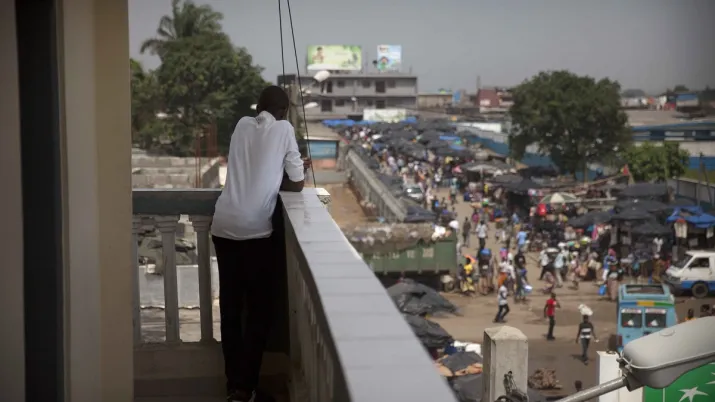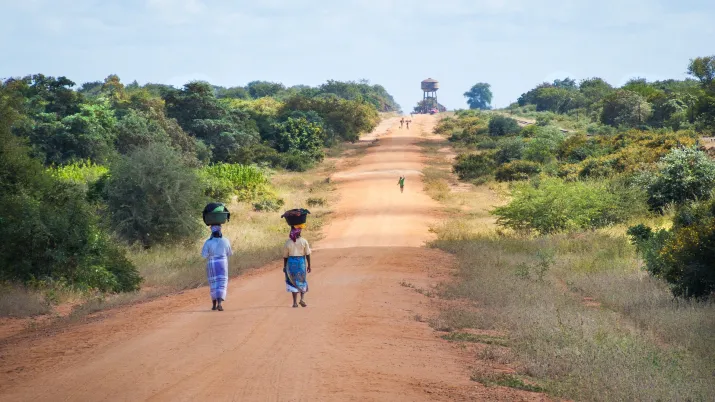 Mozambique is one of the 60 countries followed by AFD’s country-risk economists, whose assessments shed light on countries' economic trajectories and macroeconomic and financial situations.
Mozambique is one of the 60 countries followed by AFD’s country-risk economists, whose assessments shed light on countries' economic trajectories and macroeconomic and financial situations.
Context
Mozambique was AFD Group's first country of operation in Southern Africa (1981). This historic presence was made possible thanks to a wide range of financial tools mobilized over the years. Today, AFD is supporting the country in its low-carbon trajectory and in the development of basic services.
Goal
Produced by AFD's team of country-risk economists, macroeconomic country assessments provide an analysis of development processes in countries in which AFD operates. They also characterize their growth trajectory, and detect economic, social, political and financial vulnerabilities associated with these trajectories. AFD Group is thus in a position to properly measure the challenges and monitor the risks associated with each of its investments.
Emphasis is placed on developing countries, particularly in Africa, for which macroeconomic analyses are rare or infrequent. AFD seeks to complement existing production on the global economic situation, more focused on advanced economies and major emerging countries.
Find out more: Macroeconomic Analyses at AFD
Method
Country-risk analysis is based on a close follow-up over a long period of time and rooted in a fine knowledge of local contexts. Cyclical trends, often highlighted in the news, are always examined in the light of structural trends and of the regional context in which they take place. The aim is to highlight country-specific macroeconomic issues while assessing risks against comparable time- and space-based trajectories.
Country-risk economists place the study of sociopolitical vulnerabilities, the growth model, the viability of public debt, external balances and the soundness of the financial system at the heart of their assessment, and give specific attention to countries' exposure to climate risks.
Lessons learned
Mozambique is one of the world’s poorest countries and has alarming human development indicators. Yet it has had one of the most dynamic economic growth rates in the world for about 30 years. This paradox is largely due to the nature of the country’s development model. Indeed, this extractivist model is primarily based on the exploitation of raw materials with no, or only minimal, local processing prior to export.
Download our publications on the macroeconomic situation of Mozambique:
- “Mozambique: Completing the successful transformation of the economic model”, in MacroDev #58 (August 2024)
- “Mozambique: An outward-looking and externally-financing economy”, in MacroDev Semestrial Panorama #57 (July 2024)
- “Mozambique: A high-risk gamble on gas”, in MacroDev Semestrial Panorama #42 (Septembre 2022)
Contact
-
Alix VIGATO
Country Risk Economist
Discover other research projects
 Namibia is one of the 60 countries followed by AFD’s country-risk economists, whose assessments shed light on countries' economic trajectories and macroeconomic and financial situations.
Namibia is one of the 60 countries followed by AFD’s country-risk economists, whose assessments shed light on countries' economic trajectories and macroeconomic and financial situations.
Context
Present in Namibia since 1998, AFD offers diverse financing solutions and technical assistance to support the Namibian government with its development policy. AFD works with government partners, public enterprises, the private sector and civil society to promote a low-carbon transition, protect biodiversity and reduce socio-economic inequalities.
Goal
Produced by AFD's team of country-risk economists, macroeconomic country assessments provide an analysis of development processes in countries in which AFD operates. They also characterize their growth trajectory, and detect economic, social, political and financial vulnerabilities associated with these trajectories. AFD Group is thus in a position to properly measure the challenges and monitor the risks associated with each of its investments.
Emphasis is placed on developing countries, particularly in Africa, for which macroeconomic analyses are rare or infrequent. AFD seeks to complement existing production on the global economic situation, more focused on advanced economies and major emerging countries.
Find out more: Macroeconomic Analyses at AFD
Method
Country-risk analysis is based on a close follow-up over a long period of time and rooted in a fine knowledge of local contexts. Cyclical trends, often highlighted in the news, are always examined in the light of structural trends and of the regional context in which they take place. The aim is to highlight country-specific macroeconomic issues while assessing risks against comparable time- and space-based trajectories.
Country-risk economists place the study of socio-political vulnerabilities, the growth model, the viability of public debt, external balances and the soundness of the financial system at the heart of their assessment, and give specific attention to countries' exposure to climate risks.
Lessons learned
One of the richest countries in Africa, but also one of the most unequal in the world, Namibia had been mired in an economic slump since 2016, due to its extractive growth model, prior to the outbreak of the COVID pandemic. The future looks less bleak. Namibia’s comparative advantage for the production of cheap green energy particularly interests developed countries, including some in the European Union. But it is especially the recent major discoveries of offshore hydrocarbon deposits which place the country at the threshold of a new era. They are already stimulating inflows of foreign direct investment, which are reaching record levels and could propel the country into the category of oil-exporting countries.
Download our publications on the macroeconomic situation of Namibia:
- “Between renewable energy and oil, the country chooses both”, in MacroDev Semestrial Panorama #57 (July 2024)
Contact
-
Vincent JOGUET
Country risk economist
Découvrir d'autres projets de recherche
 As part of this research project, AFD is working with the Biotope/Arcadis consortium to identify the best methods for measuring biodiversity – or "biodiversity metrics" – for Public Development Banks (PDBs). This project aims to strengthen the mainstreaming of biodiversity criteria into financing decisions, thereby contributing to a more nature-positive economy.
As part of this research project, AFD is working with the Biotope/Arcadis consortium to identify the best methods for measuring biodiversity – or "biodiversity metrics" – for Public Development Banks (PDBs). This project aims to strengthen the mainstreaming of biodiversity criteria into financing decisions, thereby contributing to a more nature-positive economy.
Context
Today, the loss of biodiversity has become a major risk for financial systems. In September 2023, Ravi Menon, Chairman of the NGFS – the network of central banks, financial regulators and financial institutions for the greening of the financial system – warned: "Along with the climate crisis, the degradation of nature is an existential threat facing our planet. Addressing nature-related risks and its broader implications for the financial sector is no longer just prudent – it is an imperative".
As these risks require rigorous measurement, several frameworks have been proposed. The NGFS has published a conceptual framework for taking into account the risks associated with biodiversity loss. Target 15 of the Kunming Montreal Global Biodiversity Framework also encourages businesses and financial institutions to assess, report on and reduce the risks associated with biodiversity loss and the negative impacts they have by 2030. Lastly, the Task Force on nature-related Financial Disclosure (TNFD) has proposed a reporting framework to help businesses and financial institutions analyse and disclose these risks and impacts, recommending the use of various biodiversity metrics.
However, as the missions of PDBs focused on achieving the Sustainable Development Goals (SDGs) are very specific within financial institutions, there are few studies to help this type of institution identify the biodiversity metrics best suited to their activities.
Objectives
The main objective is to compare six biodiversity metrics to determine which are best suited to the needs of Public Development Banks. By identifying the best practices, this project aims to guide PDBs in their financing decisions, by better integrating biodiversity considerations. This harmonisation of biodiversity measurement practices will improve the environmental impact of the projects financed.
The research project also seeks to reveal the accessibility costs and the need for training within PDBs so that they can effectively integrate biodiversity considerations into their risk assessments.
This project is part of the ECOPRONAT research programme, which supports research on how to better take into account biodiversity and mainstream it into key economic sectors.
Method
Following an preliminary comparative study by The Biodiversity Consultancy, six metrics for assessing biodiversity in PDBs projects were selected: ENCORE, ABC-map, STAR, CBF, BFFI and GBS. These relevant and scientific metrics cover the main drivers of biodiversity loss.
A sample of six varied AFD projects was selected to test these metrics. The projects include initiatives in Africa, Pakistan and Mexico. The European Bank for Reconstruction and Development (EBRD) also tested the same metrics on three of its projects.
The study, conducted by Biotope and Arcadis, is being carried out in three phases:
- Launch and data collection: briefing, project validation and data collection with recommendations;
- Implementation: summary assessment, then in-depth assessment depending on the data available;
- Consolidation and reporting: analysis of results, comparison of metrics and drafting of summary report.
Results
A preliminary study proposes several protocols for the use of several metrics in order to compare their results. It also contains information that may be useful to some development banks that simply want to choose a metric and see how they can use it. With this in mind, a decision tree for choosing one of the metrics studied is proposed in Appendix 2 of this preliminary report.
Download the preliminary study
This research project aims to produce a comparative analysis detailing the advantages and limitations of the different biodiversity metrics studied. A Public Policy Dialogue provides synthetic results, a case study and specific recommendations for the integration of these metrics into PDBs financing processes.
Download the Public Policy Dialogue
The full report will be published on this page after the Biodiversity COP16 by the end of 2024. In addition, webinars and publications will be used to share the findings with a wider audience, including development and biodiversity protection stakeholders.
Download the final Research paper N°381
Contact
-
Julien CALAS
Research Officer on Biodiversity







